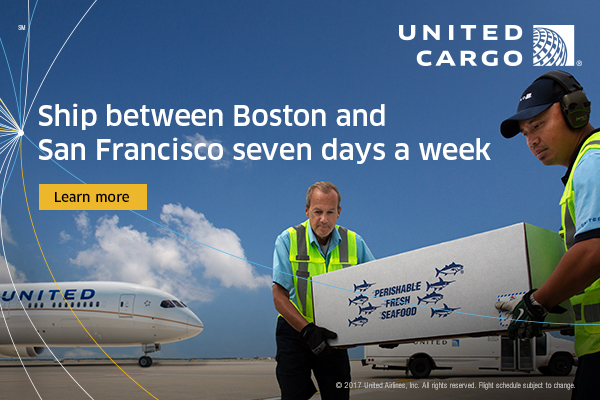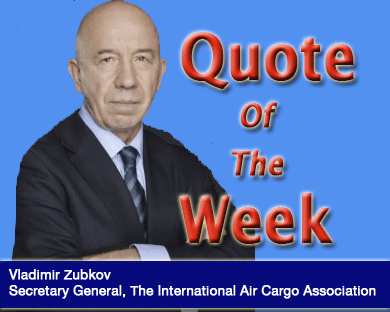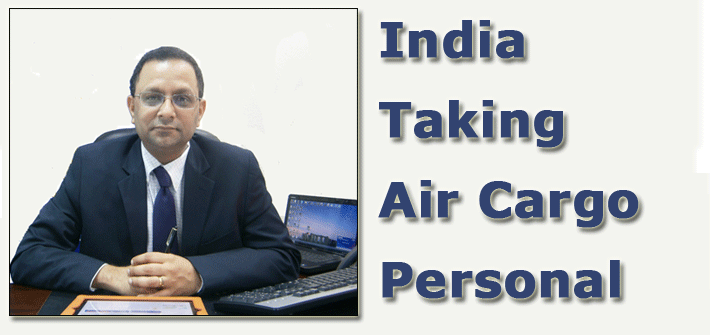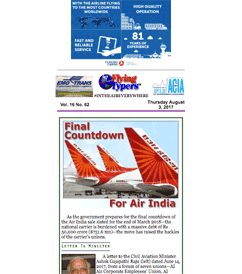 |
 |
 #INTHEAIREVERYWHERE |
| Vol. 16 No. 63 | Tuesday
August 8, 2017 |
In
October 2016, when India’s Airports Authority of India created
a wholly-owned but functionally and administratively-independent cargo subsidiary,
the AAI Cargo Logistics and Allied Services Company Limited
(AAICLAS), air cargo stakeholders felt it was the right step. The Benefits of Change Personalized handling
of cargo will be a norm now that AAICLAS has a CEO in Keku Bomi Gazder.
A cargo professional with more than three decades of experience, earlier
Gazder was with Saudia Cargo and was responsible for boosting cargo
from India. FlyingTypers met up with him to find out his
plans. The Vision Thing “At the
end of the day,” he emphasized, “it really does not matter
where one comes from as long as one can deliver the desired numbers.
Defining Various Sectors “AAICLAS will find out the sectors it has to focus on in order to grow in the next five years,” Mr. Gazder assures. “AAICLAS has been working on a five-year vision document.” Tables Are Turned
“We are at 2017 and now we need to plan where we want to reach
by 2022—with details on the verticals. Not Easy Peasy It will not be an easy task, but the top priority for AAICLAS would be to “benchmark ourselves on best practices worldwide and on the Ease of Doing Business index.”What has given Gazder the confidence is the positive development in the cargo movement in the AAI-held airports. He expects the business to grow by 10-15 percent in the current financial year and over 20 percent in the next fiscal. Tirthankar Ghosh |
 |
Why
USACIA Summit Washington September 6? Read what Jon Kent, Legislative
Representative, National Customs Brokers and Forwarders Association
of America (NCBFAA) has to say. |
In Case You Missed
This |
Last year Dimerco handled 219,000 tons of air cargo, up 8.4 percent year-over-year. Volumes were buoyed by expansion of the company’s North America and European operations, which saw year-on-year growth of 28.5 percent and 29.2 percent, respectively. Joey Chou, Corporate Vice President, Business Development, told FlyingTypers that further growth has followed this year. “For 2017 Q1, the year-to-date sales revenue of Dimerco Express Group is around USD $125 million, a 6.9 percent un-audited increase compared to the same period last year,” he said. “By region, we saw 17.9 percent year-on-year growth in our China and Hong Kong operations and 32.5 percent for Europe.” Dimerco’s global network now takes in over 140 business locations in 17 countries in Asia, Australia, North America, and Europe, along with more than 190 strategic partner agents covering the rest of the world. Looking South As Business Adds Up Chou said he was optimistic on air forwarding markets for the rest of 2017, not least because Vietnam, the Philippines, Indonesia, and India were becoming key markets for electronics and mobile phone production and/or demand. “Traffic growth has been fastest on international routes within Asia, as well as between Asia and Europe,” he added. “And the reason could be that GDP growth in the ASEAN region is forecast to be 6.4 percent in 2017.” Protectionism Not Needed As for the U.S., he said a possible shift toward protectionism represented a substantial risk, but a risk that had not yet become reality. “Asia is particularly vulnerable to a decline in global trade because the region has a high trade openness ratio, with significant participation in global supply chains,” he explained. “However, since the Asia Pacific region remains the engine of global growth and the economic conditions of major countries are stable, the future of United States’ trade policies and agreements with its critical trading partners, such as China and India, would be the key.” Strong Market Base
Dimerco’s home market of Taiwan, with its raft of multinational
electronics companies, has also provided strong base cargo flows. “For
2017 Q1, the year-to-date growth rate of overall sales revenue of Dimerco
Express Group in Taiwan is around a 7.6 percent increase compared to the
same period last year, with the tonnage up around 22 percent,” he
said. An Ocean Of Opportunities
Dimerco, like many other global forwarders, has also benefitted from the
shortcomings of ocean freight this year. It has prompted modal shift,
which saw strong uplift demand out of Hong Kong, Shanghai, Beijing, Guangzhou,
London, Milan, Frankfurt, and Chicago. But Chou said shippers were also
now looking beyond ocean and air, not least via the company’s Cross-Border
Train Freight service, which connects China with Europe, Central Asia,
and Russia via train. Dimerco has offered the CBTF for almost seven years
now and Chou said clients could benefit from 16-day transit times—around
20 days faster than ocean freight—but with only 30 percent of the
cost of airfreight. Immature Digital Forwarders Chou was also strident when asked how online forwarding companies might disrupt the businesses of incumbents. He said most digital forwarders were “immature at this stage” and would have a limited impact on established players until they learned to fully meet the service requirements of shippers. He also claimed that at present new entrants could “only provide services for general cargo” and could not meet “the complicated requirements” of real world forwarding. Disrupting The Disruptors
By contrast, he insisted providers such as Dimerco provided tailor-made
solutions and countered the threat from disruptors by investing in new
technologies that improved services. eCall Unifies Data To further improve service levels, Dimerco has also developed an “eCall Freight System,” a platform that unifies data streams and information flows with local logistics partners. “Furthermore, Dimerco will create a big data base to improve the safety of cargo freight and maximize the operation efficiency and the service quality,” added Chou. Future Innovation
Looking beyond 2017, he said innovation would be critical to the sustainable
development of Dimerco’s air freight business. |
 |
 “You haven’t heard much about GACAG recently, however the group is not disbanded, and it has some potential, being a platform for discussion, coordination and even joint decisions by TIACA, IATA, GSF and FIATA. “The latter is the coordinator for 2017 – 2018. “We set up a meeting on 29 August in Zurich. “I undertook to write a paper on the issues faced by the GACAG members. “There will be also an opportunity to meet FIATA's new Director General, Hans-Guenther Kersten, and to discuss priorities of all the four participating Associations.” |
If
You Missed Any Of The Previous 3 Issues Of FlyingTypers Access complete issue by clicking on issue icon or Access specific articles by clicking on article title |
||
 Vol. 16 No. 60 DHL Humanitarian Exceeds The Need Chuckles for July 28, 2017 Cargo Security To The Dogs Coca Cola Cole & Delta Cargo Etihad Numbers Tank In 2016 AFS Action For India |
 Vol. 16 No. 61 Women In Charge - Powering AA Cargo Chuckles for July 31, 2017 Business Booms As Q4 Looms The Airport From Hell? |
|
Publisher-Geoffrey
Arend • Managing Editor-Flossie Arend Film Editor-Ralph Arend • Special Assignments-Sabiha Arend, Emily Arend • Advertising Sales-Judy Miller |
|





